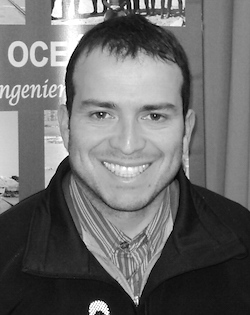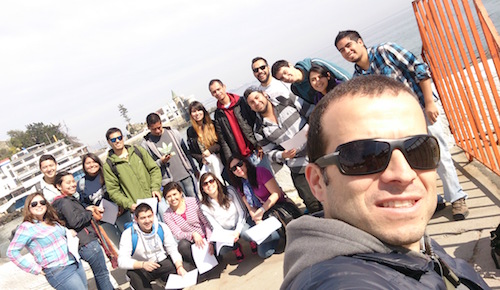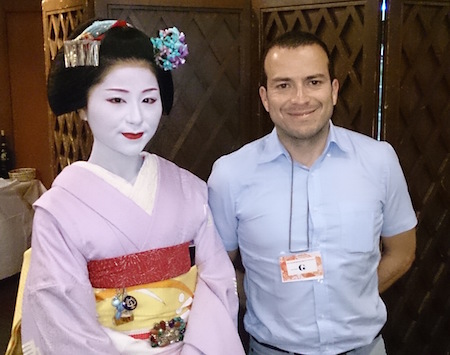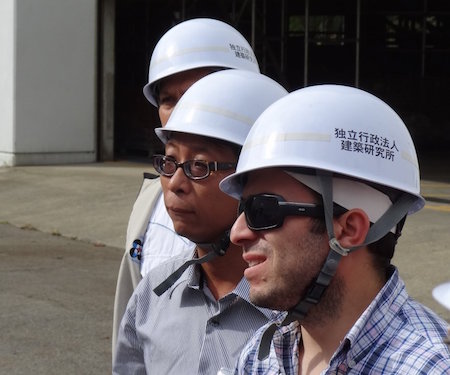 Mauricio Reyes Gallardo
Mauricio Reyes Gallardo
Professor
Ocean Engineering School, Faculty of Engineering
University of Valparaiso, Chile
Disaster Management Program (’13)
Please tell us about your career path so far. What is your area of specialization and how did you come to work in this area?
I studied civil engineering at Federico Santa María Technical University, in Valparaíso city. Following over a decade of experience in hydraulic and geotechnical engineering as project engineer and freelancer, I became a part-time professor at the University of Valparaíso. After obtaining a diploma in Maritime Engineering, and taking a master’s course in Geotechnical and Structural Engineering, I had the opportunity to become a full-time professor at the Ocean Engineering School in 2009.

Working with students on the risk assessment of horizontal evacuation routes (2015).
When, in February 2010, a big earthquake and tsunami struck the Chilean coast, I got involved in research and other activities related to tsunami disasters. We received a lot of assistance from Japan and they offered us a joint technical cooperation project (SATREPS project). After one year, when the Great Tohoku Earthquake and Tsunami struck Japan in March 2011, the project became even more important, and we received scholarship offers for studying disaster management related programs in Japan. I successfully applied and went to Tsukuba, to study a Master of Disaster Management, at the Building Research Institute and of course, in GRIPS.
You are currently a professor and researcher coordinator at the Ocean Engineering School – University of Valparaíso. Have you always wanted to pursue a career in academia? What attracts you most about it?
Yes, but I didn’t realize that at all until I started working in academia. The most attractive aspect is to be in contact with many different people, and always learning new things.
In your current capacity, what do you see as the main opportunities and challenges for Chile over the course of the next five to ten years?

With a Japanese dancer at the Geotechnical Engineering for Disaster Mitigation and Rehabilitation Congress 2014, Kyoto.
I think the main challenge is to learn how to manage a fast-growing country in a safer way, considering the actual risks of natural disasters. Chile has to play a fundamental role in Latin-America and we need to share the know-how and experience that we have accumulated from our history with earthquakes and tsunamis.
What are some of the biggest challenges you face in your work?
Well, I am working at a state-owned university where we are subject to a strong bureaucracy. This means that it is sometimes quite difficult to do research. However, there is a clear need of knowledge generation in my country. Thus the big challenge is to overcome these constraints and do meaningful research within this environment, using the power of young students and researchers.
What led you to GRIPS? What is the most important thing you got out of your studies here, and how has your experience at GRIPS prepared you for future endeavours?
As I mentioned earlier, I went to Japan thanks to a scholarship from the Japanese government to study in the Disaster Management course at GRIPS. Surely the knowledge I obtained there has been the most valuable thing, but I also have to mention the importance of all the good friends I met, and the wonderful experience of living in Japan. The future now is faced with “gambatte kudasai” in mind.
What are some of the fondest memories of your time spent at GRIPS? And what do you miss about Japan?

With Way Phyo Lynn and Rey Lumbang, at NIED during the master’s course, 2013.
My best memories are the mixture of hard work and making an effort to do the best, and the time for relaxing in a completely different country. Every day I could discover something new, while I was running, riding a jitensha (bicycle) or just wandering around. What to miss ……? The Japanese way of life and how the Japanese always show respect and humility.
How do you maintain the balance between work and the rest of your life? What is your favorite thing to do when you are not working?
I try to be more efficient and disciplined. But it is very difficult for me. Anyway I value my free time, and try to keep habits for a healthy mind and body such as running, gardening and being with the people I love.
If you could give one piece of advice to anyone considering studying at GRIPS what would it be?
Do the best in your study, and do the best to learn as much as possible from the Japanese way of living, its culture and history.
How would you like to maintain involved with the School? What do you expect from GRIPS as an alumnus?
I keep informed through the alumni mailing list, because I don’t use social networks (facebook or others) all that much. I expect from GRIPS to keep up with the good work.
Do you have any suggestions on how to further utilize the GRIPS alumni network?
It would be great if GRIPS could involve alumni through organizing thematic forums, or sponsoring seminars in countries around the world where we have alumni.





